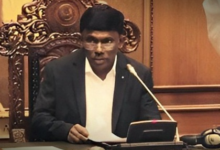Supreme Court rules that there is no need for a referendum similar to Brexit to repeal Article 370
The Supreme Court, which was debating whether to remove Article 370 in Jammu and Kashmir was legally allowed, said on Tuesday that there is no chance of a Brexit-style vote. It claimed that India is a constitutional democracy where the only way to determine the will of the populace is via established institutions.
The United Kingdom’s withdrawal from the European Union was known as Brexit. An increase in nationalistic fervor, challenging immigration difficulties, and a struggling economy all contributed to Britain’s decision to leave the EU. The five-judge panel led by Chief Justice DY Chandrachud made the remark in response to senior attorney Kapil Sibal’s argument that repealing Article 370 of the Constitution, which granted special status to the former state of Jammu and Kashmir, was a political act similar to Brexit in which the public’s opinion was sought through a referendum. When Article 370 was abolished on August 5, 2019, he claimed, this was not the situation.
Sibal was speaking on behalf of Mohd Akbar Lone, the head of the National Conference, who has contested the repeal of Article 370. The executive move to unilaterally amend the Constitutional clause that applies to Jammu and Kashmir received approval from the Parliament. He said that the key issue on which this court must rule is whether the Union of India could carry it out. Sibal has consistently questioned the authority of Parliament to repeal Article 370 in the absence of Jammu and Kashmir’s constituent assembly. He has insisted time and time again that since only the constituent assembly, whose term ended in 1957, had the authority to recommend the repeal or modification of Article 370, the constitutional provision giving J&K special status came to have a permanent character. Sibal reiterated his argument in front of the bench, which also included Justices Sanjay Kishan Kaul, Sanjiv Khanna, BR Gavai, and Surya Kant, on the third day of the hearing on the petitions contesting the Centre’s August 2019 decision.
Brexit will be recalled by this court. There was no constitutional clause (in England) requiring a referendum on Brexit. However, Sibal said that when you want to end a relationship that has already begun, you must eventually ask the people’s opinion since they should be the ones making the choice rather than the Union of India. But CJI Chandrachud wasn’t impressed.
In a constitutional democracy, gathering public opinion must go via recognized institutions. Any resort to the will of the people must be expressed and sought via recognized institutions as long as a democracy exists, as it does in terms of constitutional democracy. As a result, you cannot see a referendum along the lines of the Brexit, he told Sibal. He agreed with Sibal that Brexit was a political choice, but he added that a referendum is not an option under a constitution like ours.
Sibal argued that the repeal was a political choice made by the executive branch in a manner that was not in accordance with the Constitution. Whether or whether Article 370 was a temporary or permanent provision, according to Sibal, who fought all day, is irrelevant at this point. The main issue, according to him, is whether the Union of India may end the connection that was recognized by the constitution under Article 370.
It doesn’t matter. Permanent or temporary doesn’t matter. The way it was carried out violates the Constitution. It was done with political motivation. Executive orders are not constitutional actions; they are political acts. The current problem is neither permanent nor transient. “The reason I say this is because there could be a constitutional method to go about it. However, neither they (Centre) nor I are dealing with that (problem) in this argument. If they use it, it will be put to the test in court, Sibal added. In order to remove Article 370, Sibal has insisted that Parliament could not have taken on the duties of the constituent assembly.
He argued that the Constitution did not permit the division of the former state of Jammu and Kashmir into two Union Territories and questioned the Centre’s decision. Bihar and Madhya Pradesh cannot be split into two separate union regions. This kind of democracy is representational. Where are the voices of the people of Jammu and Kashmir in this situation? The voice of representative democracy is absent. Have you experienced any kind of representative democracy in the last five years? He said that by doing this, the whole country of India might become union territories. Even though the Constitution is a political instrument, Sibal argued that it cannot be manipulated because judges cannot remain mute.
You don’t read a Constitution in that way. Although it is a political document, it cannot be used improperly. A Constitution: What Is It? It’s a collection of values. Values on the basis of which individuals will speak out for themselves and be taken seriously. What becomes of democracy if you carry out such executive actions and muzzle the voices of the people?All I can say is that this is a historic moment, one that will shape India’s future rather than its present. Sibal concluded his remarks by expressing his hope that the court will not remain mute. The session was still unable to reach a conclusion, but it will resume on Wednesday when senior attorney Gopal Subramanian will present his case on behalf of the petitioners.
A Constitution court received many petitions in 2019 that contested the repeal of Article 370’s provisions and the Jammu and Kashmir Reorganisation Act, which divided the former state into Jammu and Kashmir and Ladakh, two union territories.







